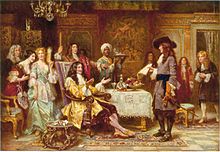
Back Geschichte von Pennsylvania German Histoire de la Pennsylvanie French ペンシルベニア州の歴史 Japanese История Пенсильвании Russian

The history of Pennsylvania stems back thousands of years when the first indigenous peoples occupied the area of what is now Pennsylvania. In 1681, Pennsylvania became an English colony when William Penn received a royal deed from King Charles II of England. Although European activity in the region precedes that date (the area was first colonized by the Dutch in 1643). The area was home to the Lenape, Susquehannocks, Iroquois, Erie, Shawnee, Arandiqiouia, and other American Indian tribes. Most of these tribes were driven off or reduced to remnants as a result of diseases, such as smallpox.
The English took control of the colony in 1667. In 1681, William Penn, a Quaker, established a colony based on religious tolerance; it was settled by many Quakers along with its Philadelphia, its largest city, which was also the first planned city. In the mid-1700s, the colony attracted many German and Scots-Irish immigrants.
While each of the Thirteen Colonies contributed to the American Revolution, Pennsylvania and especially Philadelphia were a center for the early planning and ultimately the formation of rebellion against King George III and the British empire, which was then the most powerful political and military empire in the world.
Philadelphia served as the nation's capital for much of the 18th century. During the 19th century, Pennsylvania grew its northwestern, northeastern, and southwestern borders, and Pittsburgh emerged as of the nation's largest and most prominent cities for a period of time. The state played an important role in the Union's victory in the American Civil War. Following the Civil War, Pennsylvania grew into a Republican stronghold politically and a major manufacturing and transportation center.
During the 20th century, after the Great Depression of the 1930s and World War II in the 1940s, Pennsylvania moved towards the service and financial industries economically and became a swing state politically.
© MMXXIII Rich X Search. We shall prevail. All rights reserved. Rich X Search